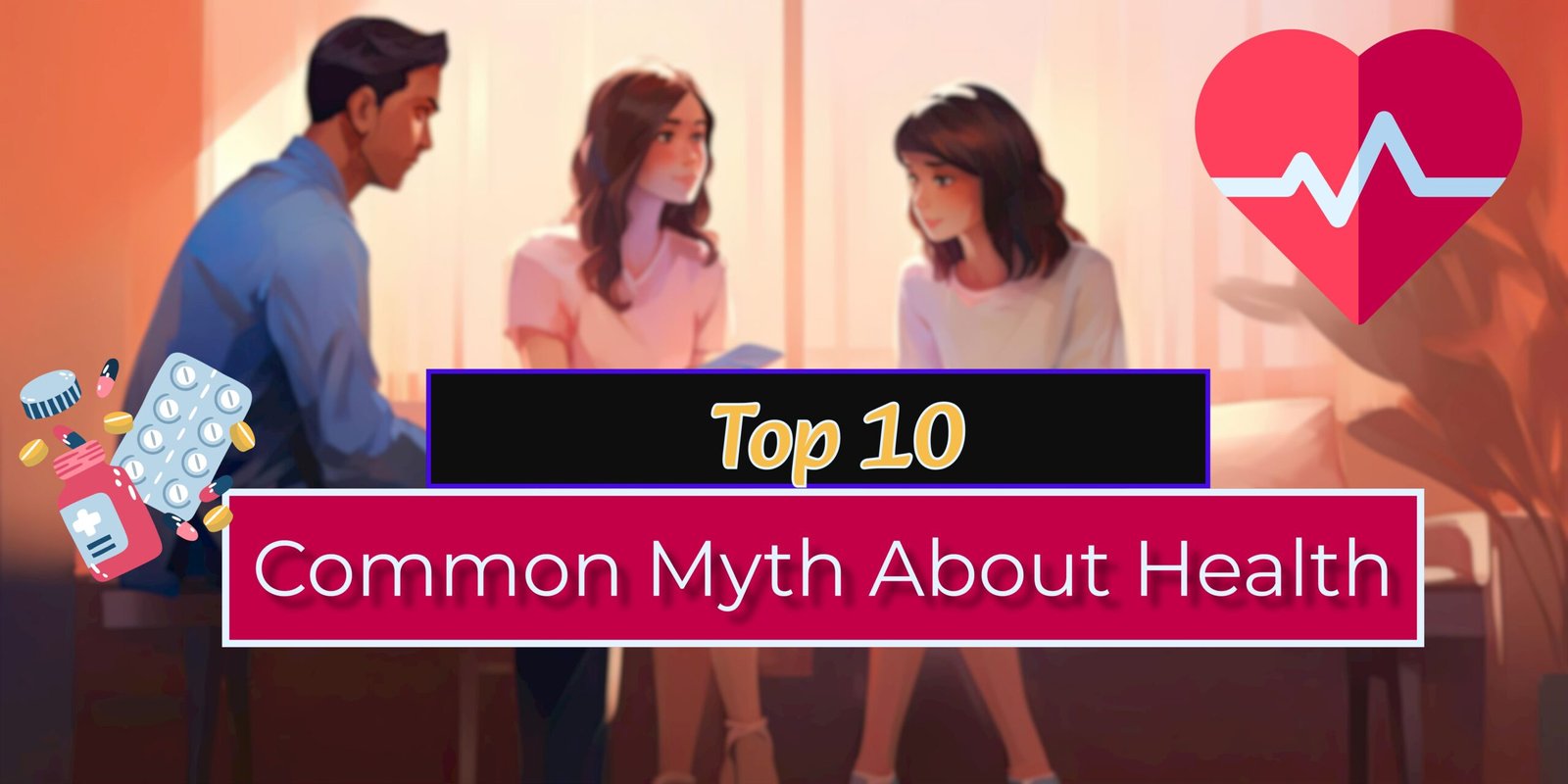Top 10 Common Facts and Misconceptions About Health
In all aspects of health and wellbeing, false information is frequently widespread. It’s critical to distinguish reality from fantasy while making decisions on our wellbeing. We’ll dispel the top 10 myths and commonly held facts about health in this extensive guide, illuminating the truths that lay beneath these widely accepted notions. Top 10 Common Facts and Misconceptions About Health.

- “You need to drink eight glasses of water a day.”
There’s a common misconception that eight glasses of water a day are necessary for good health. This recommendation, however, is not supported by science. In actuality, each individual has different demands for water depending on their age, weight, degree of exercise, and climate. Top 10 Common Facts and Misconceptions About Health. Rather than following a set amount of glasses, pay attention to your body’s thirst signals and adjust your water intake accordingly. - “Eating carbohydrates will make you gain weight.”
When it comes to controlling weight, carbohydrates frequently receive a poor rap. Granted that consuming refined carbohydrates in excess, such as white bread and sugary snacks, can lead to weight gain, not all carbohydrates are made equal. Fruits, whole grains, and When eaten in moderation, veggies are a good source of complex carbohydrates that are high in fiber and key nutrients that can help with weight loss and general health. - “A skip meals is a good way to lose weight.”
Meal skipping may appear to be a quick fix for losing weight, but it can really backfire. Missing meals increases the likelihood of overindulging later in the day, which can throw off your metabolism and result in weight gain. To sustain steady energy levels and a healthy metabolism, concentrate on eating balanced meals and snacks throughout the day rather than skipping any meals. - “Organic or natural goods are always healthier.”
Not all natural and organic products are necessarily healthier than their conventional counterparts, even though they may have certain advantages. To make educated decisions, it’s critical to study food labels and assess the nutritional value of items. Top 10 Common Facts and Misconceptions About Health. Furthermore, the presence of dangerous ingredients or excessive amounts of sugar, salt, or fat in a product is not always guaranteed by the use of organic or natural labels. - “Detox diets are an effective way to cleanse your body of toxins.”
The concept behind diets that detoxify and cleanses is that they help the body get rid of impurities and aid in weight loss. Nevertheless, these assertions are not well supported by scientific data. The liver and kidneys, which effectively remove waste and poisons, are the body’s natural detoxification organs. Top 10 Common Facts and Misconceptions About Health. The majority of detox diets severely restrict calories, which can result in vitamin deficits and other health problems. - “Reduced-fat or fat-free foods are always healthier.”
The idea that ingesting less fat would result in weight loss and better health gave rise to the low-fat or fat-free movement. To improve flavor and texture, many fat-free or low-fat goods add artificial additives, sugar, or salt to make up for the lower fat content. Top 10 Common Facts and Misconceptions About Health. The extra elements may be more harmful than the fat they are meant to replace, if not more so. Give whole, less processed foods priority over those with a high fat content. - “You should can ‘boost’ your immune system with supplements.”
The idea that supplementation strengthens immunity and staves off disease is a popular one. There is no miracle drug or supplement that can stop or treat illness, even though several vitamins and minerals are crucial for immune system function. Top 10 Common Facts and Misconceptions About Health. A balanced diet, consistent exercise, enough sleep, stress reduction, and excellent hygiene habits like handwashing are the greatest ways to maintain your immune system. - “Eating late at night causes weight gain.”
A common misconception is that eating late at night causes weight gain. The total amount of calories consumed and expended determines weight gain, not the time of meals. Eating at night won’t always result in weight gain as long as you consume the same amount of calories as you require each day. But if your late-night snacking consists of thoughtless consumption of calorie-dense, unhealthy items out of boredom or habit, it can become a problem. - “Exercise is only beneficial if it’s intense and prolonged.”
Many individuals think that extended, high-intensity exercise—like long-distance running or high-intensity interval training—is the only kind of exercise that works. Even while intense exercise offers advantages, physical activity in general is good for your health. Even mildly intense exercises like dancing, gardening, or walking can lengthen life expectancy and enhance mental and cardiovascular health. The secret is to discover things you enjoy doing and work them into your daily schedule.Top 10 Common Facts and Misconceptions About Health. - “I think you should avoid all fats to stay healthy.”
In an effort to improve health and lose weight, fats have long been vilified. But not all fats are made equally. Hormones production, nutrition absorption, and brain function all depend on healthy fats like those in avocados, nuts, seeds, and olive oil. Rather than totally shunning fats, concentrate on including moderate amounts of healthy fats in your diet. Top 10 Common Facts and Misconceptions About Health.
At the End
In conclusion, it can be difficult to navigate the realm of health and wellbeing, particularly when contradicting facts and misunderstandings are present. By dispelling these ten widespread health myths and truths, we may better equip ourselves to make decisions that promote our wellbeing. Top 10 Common Facts and Misconceptions About Health. In your search for optimum health and wellness, never forget to challenge conventional wisdom, look for reliable information sources, and give evidence-based practices top priority.

- Let go of Your Inner Crypto Cowboy: A Beginner’s Guide to Riding the Digital Frontier Crypto!
- Top 10 Common Facts and Misconceptions About Health
- best life insurance in California
- Need a Free Loan in Texas? Get Approved with Our Guide to Banks and Criteria
- How to Get a Free AdX Approval Through Yom Digi Media


Jaciel Nasul
Jamaiyah Andriychuk
Ruqaiya Beroiz
Julisa Barford
Nehamiah Aufdenberg